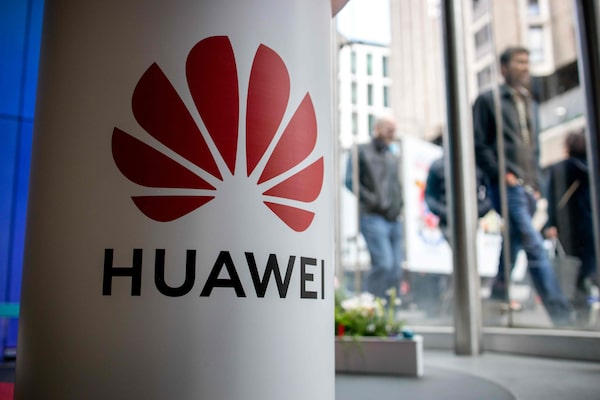
The future of Huawei in Canada is uncertain right now as the Trudeau government conducts a national-security review of the Chinese telecommunications firm.TOLGA AKMEN/AFP/Getty Images
A Canadian government research-funding agency has been trying to screen out people with "strong political opinions” on Huawei as it enlists private-sector participants to help evaluate a proposed joint venture that includes the Chinese firm and the University of Laval.
Lauren Remmler, the manager of research partnerships at Ottawa’s Natural Sciences and Engineering Research Council of Canada (NSERC), contacted prospective advisers in late April asking for their help as the agency evaluates a proposal to support a research chair with Huawei Technologies Co. Ltd. at Laval. The academic being considered for the chair is Leslie Rusch, her e-mail said.
The future of Huawei in Canada is uncertain right now. The Trudeau government is conducting a national-security review of Huawei and a cabinet decision is expected before Canadians go to the polls in October. A number of Canada’s intelligence-sharing allies, including the United States and Australia, have already banned the Chinese telecom giant from their next-generation 5G wireless networks over espionage concerns.
Three former directors of Canada’s key national-security agencies have urged Ottawa to heed the warnings of U.S. intelligence services and cut ties with Huawei.
NSERC’s Ms. Remmler, in her recruitment e-mail, suggested that private-sector players who might be averse to Huawei were not welcome on an advisory committee for the research chair. She was reaching out to selected stakeholders to consider being part of a “site visit committee” that would attend a proposed May 24 meeting in Quebec City where Huawei, Laval and Dr. Rusch would give presentations about the proposed “NSERC/Huawei Industrial Research Chair in Fiber Optic Communications Systems.”
Ms. Remmler listed off several factors – including conflicts of interest – that would disqualify someone from playing a role in helping NSERC evaluate this partnership. The Huawei-funded research chair would span a number of areas, including “spatial division multiplexing,” optical networks and “silicon photonics," Ms. Remmler said.
“Would you consider your company to be directly competing with Huawei on these topics?” she asked. She named other possible conflicts, including existing collaborations with Dr. Rusch.
Finally, Ms. Remmler asked whether the potential advisers had “strong political opinions about Huawei."
Canadians have more positive opinion of relationship with European countries than U.S., China: poll
China suspends imports from Quebec-based pork producers Olymel, Drummond
Cope optimistic BCE will be able to use Huawei gear in non-core parts of 5G networks
“If not, would you be willing to be considered for membership of the Site Visit Committee?” the NSERC manager asked.
Jim Hinton, a Waterloo, Ont., patent lawyer, said he’s surprised NSERC would be so overt about its lack of interest in hearing advice from people who are concerned about Huawei. “If you have anti-Huawei views, then you are not welcome?” he said.
He said the language in this screening process gives “political undertones” to the establishment of this research chair, noting that people with concerns and knowledge of Huawei’s security risks might be useful in offering advice.
Asked why NSERC was telling private-sector players with anti-Huawei views to exclude themselves, spokeswoman Valérie Levert-Gagnon said the agency could not disclose any information regarding “unfunded applications,” but only completed applications.
However, Ms. Levert-Gagnon said the agency "strives to avoid relying on individuals who might be in conflict with the applicants or partner organization, and to ensure that reviewers assess eligible proposals solely on the basis of their scientific merit.”
Mr. Hinton noted that Huawei, China’s largest private company, is more capable and more powerful than most, if not all, Canadian companies right now. He said NSERC seems to be saying if private-sector players have concerns "about this 800-pound gorilla, then we don’t want you to be a part of this.”
Conservative MP Peter Kent said it’s very concerning that NSERC is “apparently trying to shape and filter the broad range of advice and concerns that should be welcomed in such a sensitive project."
He also questioned why the Canadian government is helping Huawei build deeper ties to this country’s universities given security concerns about the Shenzhen firm.
“Why would any government agency work to more deeply embed a high-risk technology into Canadian academia before a final decision is made on what security experts in Canada, and our Five Eyes allies consider a dangerous compromise of national security?" Mr. Kent said.
Huawei Canada’s vice-president of corporate affairs Alykhan Velshi said the company is bound by confidentiality with respect to applications for research, but he said the Chinese company did not request the sort of screening being reported. “Not having strong political opinions about Huawei is not something Huawei either requested or expects in this application," Mr. Velshi said. He said it’s not a stipulation Huawei has requested “in other engagements with our research partners in Canada.”
Asked why NSERC has been working on a Huawei funding proposal before Ottawa makes a decision on 5G, Ms. Levert-Gagnon said “science and research are inherently open in nature [and] Canadian universities have been working with international partners for generations.”
Last month, the Massachusetts Institute of Technology (MIT) said it has cut collaborations with Huawei and fellow Chinese firm ZTE Corp. over U.S. federal investigations of the Chinese technology companies’ alleged violations of U.S. sanctions.
MIT said the move followed a new review of international projects or partnerships that pose an “elevated risk.”
With a report from Reuters
 Steven Chase
Steven Chase Colin Freeze
Colin Freeze